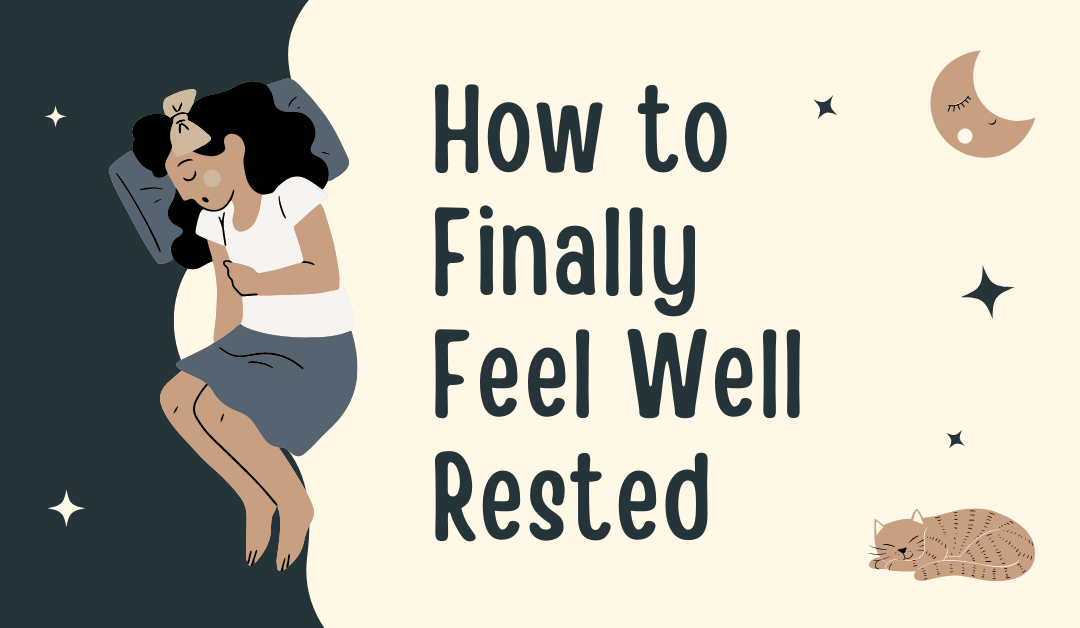Do you wake up every day, put on the coffee pot, get ready and then wonder if you even sleep at night? If so, you’re not alone. Life is a struggle, and no one really teaches you how to feel well rested or stresses the importance of getting enough sleep per night.
Well, that’s going to change today.
I’m not a sleep specialist, but I’ve done a ton of research on quality sleep and restorative sleep that I want to share with you. Instead of giving you a list of sleep tips to follow, I recommend following the steps outlined below because they’ve been crucial in my own daily routine to feel well rested in the morning.
9 Steps on How to Feel Well Rested
1. Set and Stick to a Sleep Schedule
If you want to feel well rested in the morning, the first step is to set and stick to a sleep schedule. Setting a sleep schedule means going to bed and waking up at the same time every day – even on weekends.
When you follow a consistent sleep schedule, your body will naturally be tired and ready for bed when the time comes. Your body will also wake up naturally at the same time.
Consistency is key. If you’re following a schedule, you can be sure that you’re getting enough sleep most (if not all) days of the week. When you don’t follow a schedule, you may get to bed late one or two nights a week, which can throw off your entire rhythm.
2. Exercise During the Day
Want to know how to sleep less and still feel well rested? Get better sleep. The link at the start of the paragraph is a great place to start learning about sleep quality and the different types of sleep you’ll experience.
But without getting too technical, exercise during the day to sleep better at night.
Why?
- A review of 29 studies found that exercise improves both sleep duration and quality
- Four studies in the review found no impact of exercise on sleep
- One study found exercise negatively impacted sleep
So, the majority of studies found that exercise improves restful sleep and will help you feel well rested.
What happened in the other studies?
We can’t say with 100% certainty what happened with the other studies, but it’s very possible that participants did one of the following:
- Exercised too close to bedtime and had a jolt of energy after (don’t exercise if you have three hours or less before your head hits the pillow)
- Regular exercise wasn’t intense enough to promote better, deep sleep
Exercise is great for promoting sleep – in my experience. If you engage in intense endurance workouts, they can also make you sleep better. However, if you’re just “there” in the gym and not really pushing yourself, you might not notice a difference in how rested you feel the next morning.

3. Start Going Outside for 30+ Minutes a Day
Want to know how to feel well rested? Go outside. This may sound like “hocus pocus” to some or a crazy natural promotion, but it’s not. In fact, a study was done on increasing daylight exposure and sleep.
Participants in this study were office workers behind EC glass.
But, many experts recommend just going outdoors for about 30 minutes a day. Read a book. Exercise. Or just do something outside that you want to do.
Why?
The study found:
- Optimizing daylight led to better overall sleep
- Light exposure increased cognitive assessments by 42%
The CDC also recommends that you spend 30 minutes a day outside. Why? If you expose yourself to natural light, it will strengthen your biological rhythms. These rhythms will help you sleep better at night and feel more awake and energized during the day.
4. Establish a Bedtime Routine
Routines seem to help with everything. If you want to feel well rested, create a sleep routine. The issue that many people have, and this is definitely true for myself, is that I try cheating the system.
My ideal sleep routine looks something like this:
- Go to sleep at 11
- Wake up at 6 – 6:30
But when I finish work late or binge-watch television, I’ll stay up to 12 or 1 and still try to get up by 6:30. The first day, I might feel great, but I’ll eventually begin to feel tired and worn out.
You need to get a certain number of hours of sleep, often 7 – 8, for most people reading this article. Set a sleep schedule that you can follow every day and just stick to it. Within a week or two, you’ll realize that you knew how to feel well rested the entire time: sleep enough.
P.S. We have an intense article on how to get to bed on time starting tonight.
5. Incorporate Relaxation Techniques Into Your Nightly Routine
Some people are always going. You know, the people that clean the house, walk the dog, put the kids to bed, work on their degree and then plop into bed just thinking about what they’re going to do in the morning.
If you’re like this, drink a glass of wine and create a relaxation routine to actually get tired.
A few ways to do this are:
- Take a warm bath about 30 – 60 minutes before bed
- Practice deep breathing
- Engage in meditation
- Listen to soothing music
- Anything that relaxes you
Sleep architecture is important, and if you want to stop having a poor sleep and feeling exhausted in the morning, be sure to incorporate relaxation techniques before bed.
6. Don’t Eat a Big Meal Before Bed
If you want to wind down for the night, don’t eat a big meal. Certain foods will keep you awake at night. Instead, try not having a big meal before bed unless you know that the meal won’t keep you awake.
For example, if I eat a big bowl of pasta, it’s almost a guarantee that I’ll fall asleep very fast.
But, in general, try not eating within 2 – 3 hours before bed.
7. Avoid Caffeine and Naps in the Afternoon
If you can, avoid drinking caffeine after late afternoon or early evening. Caffeine takes 3 – 5 hours to half leave the body. The remaining 50% of the caffeine may remain in the body for a lot longer.
8. Change Your Space to Promote a Good Night’s Sleep
Now that you’re not drinking your caffeinated hot or cold brew coffee, it’s time to focus on your space. A few of the changes that you can make in your space to promote sleep are:
- Eliminate light – blackout curtains work well
- Keep the room at 60 – 67 degrees Fahrenheit
- Eliminate noise
You really just need to block outside light, even if this means wearing a sleep mask, putting on a white noise machine and lowering your body temperature by keeping the room cool.
9. Make Sure You Don’t Have a Sleep Disorder
 Sleep disorders may not seem common, but when you look through the symptoms outlined by the CDC, there are quite a few that you may have. If you’re trying to learn how to feel well rested, go through these symptoms and check any that you’re experiencing:
Sleep disorders may not seem common, but when you look through the symptoms outlined by the CDC, there are quite a few that you may have. If you’re trying to learn how to feel well rested, go through these symptoms and check any that you’re experiencing:
- You take 30 minutes or more to fall asleep
- You wake up earlier than you should in the morning
- You sleep 7 – 8+ hours a night and don’t feel rested
- When you wake up, you feel like it’s difficult to move
- You use stimulants to stay awake during the day
- Your arms or legs jerk when you sleep
- When you sleep, you snore loudly or make a choking sound, often attributed to sleep apnea
- Sometimes, you have sudden muscle weakness when you laugh or get angry
- If given a chance to nap, you fall asleep within 5 minutes
Of course, these are just some of the symptoms of a sleep disorder that you should be concerned about. A doctor’s checkup will help verify if you have a disorder or if you need to change up your bedtime routine.
Final Thoughts
If you’re struggling to feel well rested in the morning, even after a good night’s sleep, consider talking to your doctor. Sleep disorders are very real and may be the culprit holding you back from feeling well rested.
Now that you know how to feel well rested when you wake up, it’s time to go through each of these steps and see how they work for you.
Often, small tweaks to your sleeping habits can make you feel so much better.

